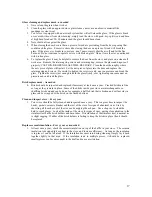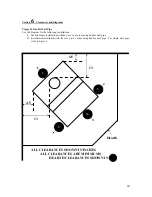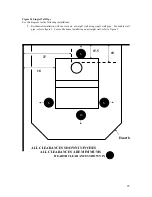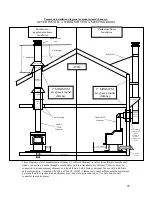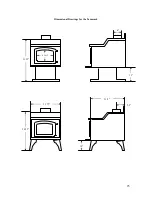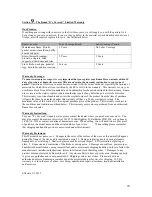
27
Stove won’t burn hot enough. Lazy burn.
1.
Wood is not seasoned (still green). Wood should sit for about 1 year, split and loosely stacked if it
was cut green.
2.
Wood is well seasoned but has a lot of surface moisture. Your wood supply must be covered.
Check your tarps or other covering to see that no rain or snow is getting to your wood. Wood
should be covered on top, but open on the sides to allow air movement to aid in the drying.
3.
Chimney and/or the chimney cap needs to be cleaned. Your chimney should be checked and
cleaned if necessary every few months. Even a small amount of buildup can cause a draft
restriction, for example: ¼ inch of buildup on the side wall of a 6” chimney reduces the effective
area of the chimney by about 20%. Pay close attention to the chimney cap, especially if it has a
screen. Screened chimney caps can become blocked enough to restrict flow in just a few weeks.
4.
Check the air supply to the stove. If you have installed outside air, check the ducts for blockage.
If you are not using outside air, be sure you have removed the cover plate on the back of the
pedestal. (pedestal models only)
5.
Atmospheric conditions. Occasionally, barometric episodes occur that affect draft, thereby
affecting stove performance. If your stove has been working fine and performance drops
suddenly, this is most likely the cause, and will usually go away within a few days.
6.
Your fuel load may be too small or the wood size too large for the coal bed. A small bed of coals
requires re-kindling to build up the heat, only put large chunks of wood on a very hot and active
bed of coals.
Burn time too short.
1.
Your fuel load may be too small or the wood size too large for the coal bed. A small bed of coals
requires re-kindling to build up the heat, only put large chunks of wood on a very hot and active
bed of coals. If there are large chunks of charred wood left after the fire has gone out, the coal bed
was not hot enough.
2.
Fuel quality. Harder, denser woods produce longer burn times. Likewise, softer woods produce
shorter burn times.
3.
The ash pan may not be sealing correctly. Check the ash pan gasket for tearing or fraying. See the
ash pan instructions in section 5. Even a small amount of undesired air can keep the stove from
shutting down.
4.
Check the main door gasket and glass gasket for proper seal. See section 5 for instructions on
checking your gaskets.





